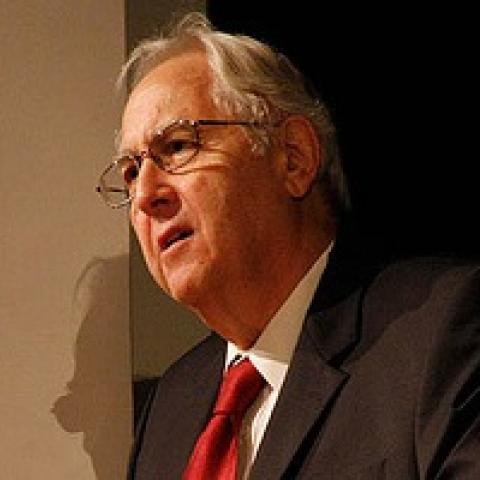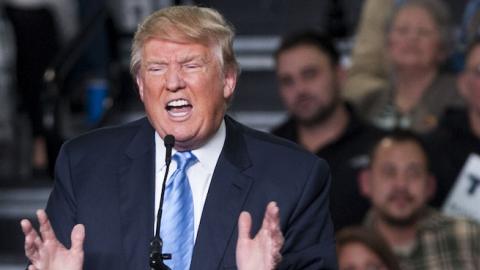It looks like Donald Trump and Vladimir Putin have formed a mutual admiration society. A few days ago, Trump was very pleased to hear that Putin had praised him as “an outstanding and talented personality,” and “a bright and talented person.” And Putin in turn was pleased: “He says that he wants to move to another level of relations, to a deeper level of relations with Russia. How can we not welcome that? Of course we welcome it." Trump’s response: “It is always a great honor to be so nicely complimented by a man so highly respected within his own country and beyond."
But when Trump called in to MSNBC’s Morning Joe as he has done many times, Joe Scarborough and Mika Brzezinski did not give him the kind of reception he is accustomed to. Scarborough told Trump that Putin was “also a person who kills journalists, political opponents, and invades countries. Obviously that would be a concern, would it not?" "He's running his country, and at least he's a leader," Trump replied. "Unlike what we have in this country."
"But again,” Scarborough said, “he kills journalists that don't agree with him.” Trump responded that there was "a lot of killing going on" around the world, and that “our country does a lot of killing also, Joe.” That’s the kind of moral equivalence one expects from the editors of The Nation magazine.
Scarborough gave Trump an out and said, “You obviously condemn Vladimir Putin killing journalists and political opponents, right?” Trump then replied: “Oh sure, absolutely.” Somehow, I don’t think I’m alone in doubting the sincerity of that afterthought handed to him on a platter by Scarborough.
In case anyone doubts Putin’s repressive record, the Committee to Protect Journalists provides a list of the 53 journalists murdered in Russia from 1993 through 2013. And here is another list from CNN of the critics of Putin’s government who have been put under house arrest, imprisoned, sent into exile, or murdered. You may remember the names of some of those murdered, like Alexander Litvinenko and Anna Politkovskaya, since their assassinations received major press coverage.
The most recent to get worldwide attention was that of opposition leader and former Deputy Prime Minister Boris Nemtsov, who led the liberal opposition group, the Republican Party of Russia/People’s Freedom Party. Nemtsov had just told the Western press that in his eyes, Russia was drowning under Putin’s leadership and was on its way to becoming a fascist state, and he condemned what he called the “mad, aggressive and deadly policy of war against Ukraine.”
After he led a demonstration against the regime that brought out tens of thousands, and two days before he was scheduled to lead another major rally, Nemtsov was shot dead on a bridge a few blocks from the Kremlin. It was a brazen assassination in an area where many cameras were set up for security purposes. Yet somehow, the authorities were not able to identify or detect who had shot him. One does not have to be a master detective to figure out why a popular leader with a following, unafraid of making strong anti-regime statements, would be murdered gangland style.
Putin seems to fulfill two of Trump's top criteria in assessing leaders: he is a “strong” and “powerful leader” whose polls are very high in Russia. Trump, as Noah Rothman has pointed out in Commentary, is not only the Republican front-runner, but in essence has become “The Kremlin’s Candidate” in the United States.
The problem with this is that Putin is, at present, one of the major threats to both U.S. national security and our democratic values. Rothman writes that it is not “merely dissidence but divergence — racial, ethnic, religious, and sexual — [that] is criminalized in the New Russia. Putin’s program is one of cultural and racial homogeneity.” All of this Trump ignores, concentrating on his delusional belief that Putin should be an ally and America’s main partner in fighting ISIS.
Trump and his supporters ignore that Putin has his own clear aims, and they are not compatible with those of the United States. What Putin has made clear is that his ultimate goal is the restoration of the kind of empire that was lost with the collapse of the Soviet Union, which he has called the greatest “geographical catastrophe."
In Syria, we should seriously consider that the enemy of our enemy is not always our friend. Rather than fighting ISIS, as Putin claims, the Russian air force has been dropping bombs scattershot over areas controlled by forces who are fighting both Assad and ISIS. As the New York Times reported on Sept.30th, “Russians Strike Targets in Syria, but Not ISIS Areas.” One of their bombers’ targets turned out to be Syrian forces trained by the CIA to engage ISIS troops. And as John Kerry himself noted, 80 percent of Russian air strikes are still aimed at opposition groups fighting Assad, not on ISIS.
Ironically, as a result of the failure of the Obama administration to devise any serious strategy for defeating ISIS, the U.S. has suddenly made an apparent about-face and has dropped the demand that “Assad must go.” In his most recent statement, Secretary of State Kerry has moved in the very direction sought by Putin, that of accepting Assad’s regime as a given, in the hope that some kind of deal will be worked out that leaves Assad and his regime in power. Kerry thinks this might lead to a settlement that could end the current Syrian civil war.
Hence, the new UN Security Council resolution to implement a plan for a ceasefire and peace process says nothing about whether Assad and his regime will be able to stay in power, or whether Assad himself will be allowed to run in scheduled elections. As for elections, Assad remains a puppet of Iran and Moscow and their power and influence in the region would be hindered if he is defeated. As a supporter of Putin, Trump would, in effect, be a partner of Putin and Iran in standing against regime change and arranging for a peace that leaves in power one of the world’s great murderers who has killed at least 250,000 of his own people and led untold others to flee Syria for their lives.

















